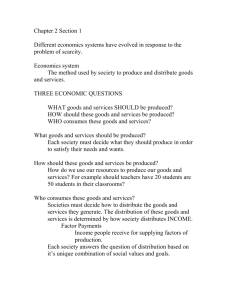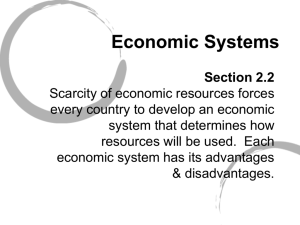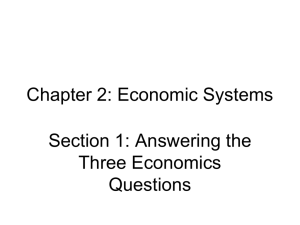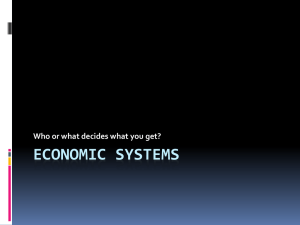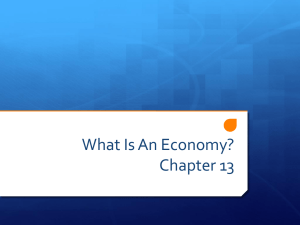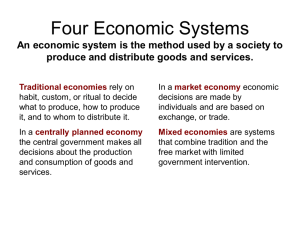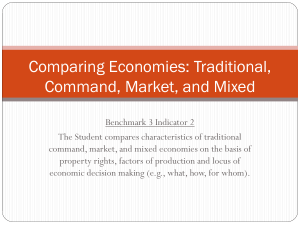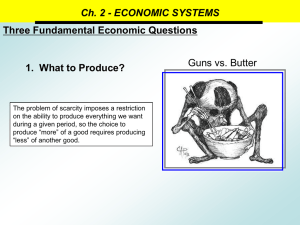1 Types of Economic Systems
advertisement
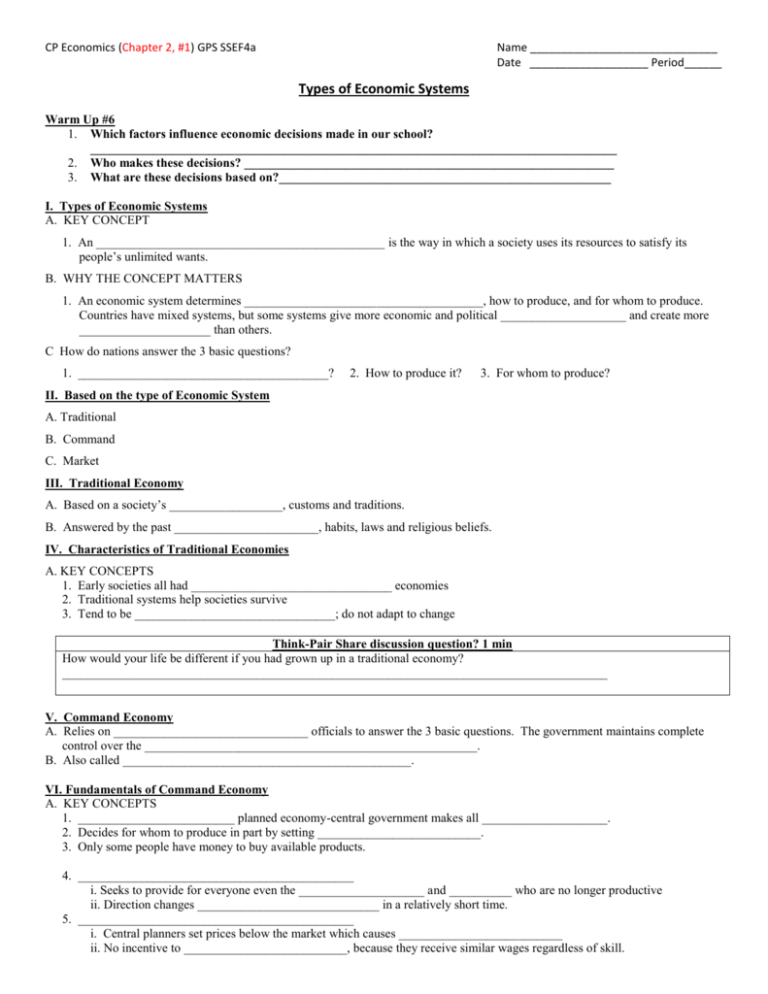
CP Economics (Chapter 2, #1) GPS SSEF4a Name ______________________________ Date ___________________ Period______ Types of Economic Systems Warm Up #6 1. Which factors influence economic decisions made in our school? ____________________________________________________________________________________ 2. Who makes these decisions? ___________________________________________________________ 3. What are these decisions based on?_____________________________________________________ I. Types of Economic Systems A. KEY CONCEPT 1. An ______________________________________________ is the way in which a society uses its resources to satisfy its people’s unlimited wants. B. WHY THE CONCEPT MATTERS 1. An economic system determines ______________________________________, how to produce, and for whom to produce. Countries have mixed systems, but some systems give more economic and political ____________________ and create more _____________________ than others. C How do nations answer the 3 basic questions? 1. ________________________________________? 2. How to produce it? 3. For whom to produce? II. Based on the type of Economic System A. Traditional B. Command C. Market III. Traditional Economy A. Based on a society’s __________________, customs and traditions. B. Answered by the past _______________________, habits, laws and religious beliefs. IV. Characteristics of Traditional Economies A. KEY CONCEPTS 1. Early societies all had ________________________________ economies 2. Traditional systems help societies survive 3. Tend to be ________________________________; do not adapt to change Think-Pair Share discussion question? 1 min How would your life be different if you had grown up in a traditional economy? _______________________________________________________________________________________ V. Command Economy A. Relies on _______________________________ officials to answer the 3 basic questions. The government maintains complete control over the _____________________________________________________. B. Also called ______________________________________________. VI. Fundamentals of Command Economy A. KEY CONCEPTS 1. _________________________ planned economy-central government makes all ____________________. 2. Decides for whom to produce in part by setting __________________________. 3. Only some people have money to buy available products. 4. ____________________________________________ i. Seeks to provide for everyone even the ____________________ and __________ who are no longer productive ii. Direction changes _____________________________ in a relatively short time. 5. ____________________________________________ i. Central planners set prices below the market which causes __________________________ ii. No incentive to __________________________, because they receive similar wages regardless of skill. VII. Fundamentals of a Market Economy A. KEY CONCEPTS 1. Individuals answer the 3 basic economic questions. 2. __________________________________________- right to own businesses and resources 3. Property means material objects, money, intellectual property, _________________ 4. ______________________________- place or situation where people buy and sell goods, services B. Private Property and Contracts 1. Owned by individuals, ______________________________, instead of the government 2. _____________________________________ agreements to buy and sell goods and services, oral or written, it is legally binding. C. Limited Government Involvement 1. Government establishes health and safety laws, ___________________________ banking practices, and _____________________________ discrimination in the workplace. 2. __________________________________________-is the principle that the government should not interfere in the marketplace D. Competition 1. Is the economic _________________________________ that exists among businesses selling the same or similar products. (___________________________________) 2. ____________________________________________________ a. Consumers are free to purchase what they want and refuse products they do not want E. Voluntary Exchange in Markets 1. Market economies allow _________________________ and _________________________ to make choices for their own benefit. 2. ___________________________________________ a. When producers and consumers benefit in a trade transaction. b. _____________________________________________ i. The ______________________________ for financial gain that a seller makes from a business transaction. F. When there is Voluntary Exchange businesses can _______________________________________. 1. _____________________________________ a. Is a situation in which people _______________________________________ their efforts in the ___________________________ that they do best. b. encourages efficient use of resources c. leads to _________________________________, lower-priced products Think-Pair Share discussion question? 1 min List below at least 2 disadvantages of a market economy? 1. ___________________________________________2. ________________________________________ VIII. Today _________ economies are really mixed! A. KEY CONCEPTS 1. ________________________________________ has elements of traditional, command, and market systems 2. ____________________________________________________________________________________ 3. Traditional, command, market economies adopt elements from others Closure Activity #4 Explain in detail, which of the following economic systems do you prefer? _________________________________________________________________________________________________________ _________________________________________________________________________________________________________
